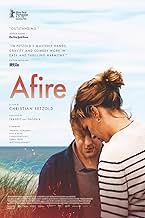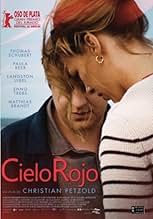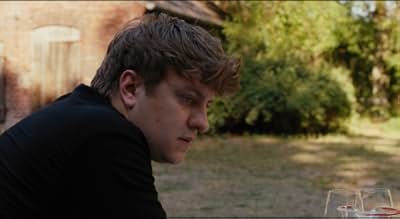VALUTAZIONE IMDb
7,1/10
10.123
LA TUA VALUTAZIONE
Un gruppo di amici si trova in una casa per le vacanze sul Mar Baltico dove le emozioni aumentano mentre la foresta arida intorno a loro prende fuoco.Un gruppo di amici si trova in una casa per le vacanze sul Mar Baltico dove le emozioni aumentano mentre la foresta arida intorno a loro prende fuoco.Un gruppo di amici si trova in una casa per le vacanze sul Mar Baltico dove le emozioni aumentano mentre la foresta arida intorno a loro prende fuoco.
- Premi
- 10 vittorie e 28 candidature totali
Recensioni in evidenza
"Leon" (Thomas Schubert) and his friend "Felix" (Langston Uibel) head to a remote rural cottage near the Baltic coast so the former man can put the finishing touches to his novel before a visit from his publisher (Matthias Brandt). They arrive, though, and discover that "Nadja" (Paula Beer) is already staying - and this upsets the apple cart a bit. "Leon" quickly becomes obsessed - and that only gets worse when her nocturnal activities with life guard "Devid" (Enno Trebs) and some wafer thin walls force him to sleep in the garden amongst the mosquitoes. What now ensues is quite an intricately constructed observational presentation that looks at the evolving dynamic between the four - and it doesn't pan out as you might expect, especially once it becomes clear that his latest literary work is nobody's idea of a magnum opus. The characterisations here have a fluidity to them that makes for quite an interesting watch. None of them could ever be described as beautiful - in any classical sense - so the story is much more about their traits, flaws and foibles than about their looks. That works up to a point, but there was too much missing from the puzzle for me to really find myself engaged with any of them. The last twenty minutes - set amidst some lethal forest fires - was rushed and seemed to me indicative that "Leon" wasn't the only one who'd suffered from a writer's block! The photography is effectively intimate at times but at other times we see just too many shots walking to and from the beach (and the constant buzzing of the mozzies got on my nerves a bit, too, after a while!). I did quite enjoy this, but somehow it just lacked substance before a conclusion that just seemed to be unnecessarily ghastly. Give it a go, though...
In interviews director Christian Petzold gave in connection with the release of "Roter Himmel" he said that he was inspired by French summer / coming of age films from for example Eric Rohmer. According to Petzold this type of film had disappeared out of German cinema since "Menschen am Sonntag" (1930, Robert Siodmak, Edgar Ulmer and Rochus Gliese). "Roter Himmel" is indeed situated during summer, but that is where any comparison ends. The beginning of "Roter Himmel" is much more a parody on the American style coming of age films such as "The cabin in the woods" (2011, Drew Goddard) with a car breaking down in the woods and creepy animal noices thereafter.
"Barbara" (2012, Christian Petzold) was still an explicit political movie about living in the DDR. Since then the films of Petzold have remained socially concerned but have become more abstract. In "Undine" (2020) a water nymph symbolizes the element of water. In "Roter Himmel" forest fires sumbolizes the element of fire. It looks like Petzold has begun a series about the elements, just like Krzysztof Kieslowski made a series about the ideals of the French revolution in the 90's. We are looking forward to the next film.
Forst fires are unfortunately very actual in the summer of 2023. However these fires are not the main theme of the film. "Roter Himmel" is not an eco-drama. They remain on the background, at least that is what we and the characters in the film belief for (too) long.
The main character of the film is Leon (Thomas Schubert), a writer writing his second book and desperately trying to match the success of his first novel. He wraps his uncertainty in a cloak of arrogance and self esteem and in so doing gets estranged from the people around him. These people are for him more an obstacle for working undisturbed than a source of inspiration. When they go for a swim he always says that his work doesn't allow him to join them, only to waste his time when they are gone.
An important moment in the film comes when the publisher of Leon meets him to discuss the progress of his work. He doesn't like the manuscript, but he is very interested in what the people around Leon are doing. Will Leon's eyes finally open?
"Barbara" (2012, Christian Petzold) was still an explicit political movie about living in the DDR. Since then the films of Petzold have remained socially concerned but have become more abstract. In "Undine" (2020) a water nymph symbolizes the element of water. In "Roter Himmel" forest fires sumbolizes the element of fire. It looks like Petzold has begun a series about the elements, just like Krzysztof Kieslowski made a series about the ideals of the French revolution in the 90's. We are looking forward to the next film.
Forst fires are unfortunately very actual in the summer of 2023. However these fires are not the main theme of the film. "Roter Himmel" is not an eco-drama. They remain on the background, at least that is what we and the characters in the film belief for (too) long.
The main character of the film is Leon (Thomas Schubert), a writer writing his second book and desperately trying to match the success of his first novel. He wraps his uncertainty in a cloak of arrogance and self esteem and in so doing gets estranged from the people around him. These people are for him more an obstacle for working undisturbed than a source of inspiration. When they go for a swim he always says that his work doesn't allow him to join them, only to waste his time when they are gone.
An important moment in the film comes when the publisher of Leon meets him to discuss the progress of his work. He doesn't like the manuscript, but he is very interested in what the people around Leon are doing. Will Leon's eyes finally open?
Fire is a force that can destroy and devastate, but it's also one thar can cleanse, sweeping away what's of questionable value in order to clear space for robust, vigorous, valued new growth. And, sometimes, it can do both simultaneously, as demonstrated in writer-director Christian Petzold's latest, a searing drama/wry comedy about four old/newfound friends who are unwittingly drawn together at a summer house near the Baltic seacoast. Their time together proves revelatory, stressful and enlightening, in part because of their interactions, the disclosures that come out of those relationships, and the looming threat of ravaging forest fires that threaten them and their existence, both literally and metaphorically. The film is a slowburn in every sense of the word, especially at the outset, with a somewhat cryptic narrative that seems rather meandering at times, but that sets the stage for what's to follow in the back half. The picture subsequently presents a witty but profoundly insightful examination of what makes us who we are, how much we enjoy or endure our lives, and what we can do to make it better for ourselves when we eliminate what no longer serves us. In many respects, "Afire" is probably not what most viewers will expect, but, then, that's a huge part of its appeal, a refreshing, engaging look at life and what we make of it, a valuable exercise given how abruptly it can all be taken away, leaving us to ask ourselves, what did we do with the time we had and was it indeed worth it in the end? Give this one time to unfold, and let it sink in. It may help you realize and understand more about yourself than you can possibly imagine.
The actor Thomas Schubert deserves much of the credit for making "Afire" work as well as it does.
He plays a self-absorbed, petty, insecure writer who's so myopically obsessed with the book he's writing that he's oblivious to the world around him. In other hands, it would be a big ask of the audience to spend two hours with such a tiring character, especially since he's in virtually every scene of the movie. But Schubert is able to make this character not only tolerable, but relatable. We're all guilty of missing the bigger picture because of our individual preoccupations.
The ending of "Afire" feels a bit overly dramatic. It's like something that would feel right at home in one of those Southern gothic plays by Tennessee Williams or Eugene O'Neill. But I did enjoy the irony of its conclusion -- once our main character starts paying attention to the trauma around him, it's something he uses to write better books.
Grade: A.
He plays a self-absorbed, petty, insecure writer who's so myopically obsessed with the book he's writing that he's oblivious to the world around him. In other hands, it would be a big ask of the audience to spend two hours with such a tiring character, especially since he's in virtually every scene of the movie. But Schubert is able to make this character not only tolerable, but relatable. We're all guilty of missing the bigger picture because of our individual preoccupations.
The ending of "Afire" feels a bit overly dramatic. It's like something that would feel right at home in one of those Southern gothic plays by Tennessee Williams or Eugene O'Neill. But I did enjoy the irony of its conclusion -- once our main character starts paying attention to the trauma around him, it's something he uses to write better books.
Grade: A.
It's fair to say, there's no inferno or great blaze, and there's a good chance half way through, your eyes might start to glaze, the meandering's quite slow, although there is a subtle glow, but it struggles to compete with perpetual malaise. The perspective needs your mind to persevere, for reflections to emerge and re-adhere, consider landscapes past and present, how they change, evolve and ferment, locking horns with dread, anxiety and fears. The performances are fine, there is intent, although poor Leon is in permanent descent, lacks a flicker and a spark, you wouldn't say he is a lark, one of those people you might call, quite malcontent.
Lo sapevi?
- QuizChristian Petzold binged the films of Éric Rohmer while developing this project.
- ConnessioniReferenced in Film Junk Podcast: Episode 929: Perfect Days + I.S.S. (2024)
- Colonne sonoreIn My Mind
Performed by Wallners
I più visti
Accedi per valutare e creare un elenco di titoli salvati per ottenere consigli personalizzati
- How long is Afire?Powered by Alexa
Dettagli
Botteghino
- Lordo Stati Uniti e Canada
- 244.803 USD
- Fine settimana di apertura Stati Uniti e Canada
- 38.485 USD
- 16 lug 2023
- Lordo in tutto il mondo
- 2.295.497 USD
- Tempo di esecuzione1 ora 42 minuti
- Colore
- Proporzioni
- 1.85 : 1
Contribuisci a questa pagina
Suggerisci una modifica o aggiungi i contenuti mancanti

Divario superiore
What is the Canadian French language plot outline for Il cielo brucia (2023)?
Rispondi

























